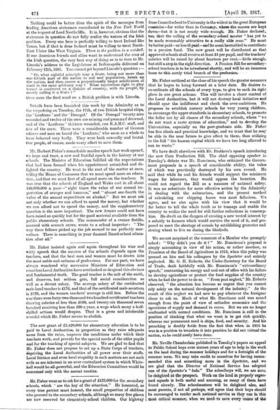We arena surprised at the comment of a Member who
promptly asked : "Why didn't you do it ? " Mr. Runeiman's proposal is simply astonishing in view of his action, or rather inaction, as President of the Board of Agriculture in 1915, when this policy was pressed on him and his colleagues by the Spectator and entirely neglected. Mr. G. IL Roberts, the Under-Secretary for the Board of Trade, dealt faithfully with Mr. Rimcim an's "extraordinary speech," contrasting his energy and zeal out of offioe with his failure to develop agriculture or protect the food supplies of the country when he had the power to do so. "From past neglect," Mr. Robert observed, "the situation has become so urgent that you cannot rely solely on the natural development of the industry." As tho result of this neglect we had now to pay whatever the foreigner chose to ask us. Much of what Mr. Rtineiman said was sound enough from the point of view of orthodox economies and tho operations of supply and demand in yam% tat we are no longer confronted with normal conditions. Mr. Runciman is still in the posit-inn of thinking that what we want is to get rich quickly, whereas our paramount need is ships, food, and security. And his preaching is doubly futile from the feet that when in 1915 he was in a position to translate it into practice he did not victual the nation, as he could easily have done.


































 Previous page
Previous page